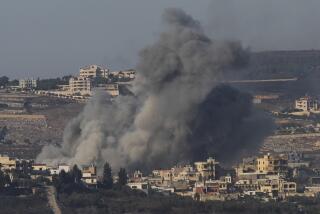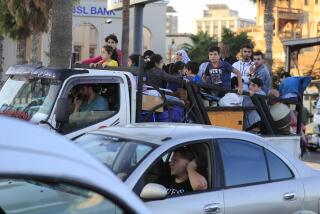4 Arabs Called Heroes but Are Unwanted
DAMASCUS, Syria — A day after being expelled to Lebanon by Israeli authorities, four Palestinians were accorded a heroes’ welcome Thursday--but then they were told that no Arab country wants them either.
The four men, who wandered out of the Israeli-controlled “security zone” Wednesday into the arms of Lebanese and Syrian army troops in the town of Rachaiya, eventually found temporary refuge Thursday with a hard-line Palestinian faction that has bases scattered through Lebanon’s Bekaa Valley.
In a brief ceremony at the offices of the Popular Front for the Liberation of Palestine in Jlala, the four deportees--whose luggage consisted of plastic bags emblazoned in Hebrew--were given tiny medals in the shape of the green, white, red and black Palestinian flag.
The PFLP, headed by George Habash, is a hard-line Marxist group with close ties to the Syrians.
After the medals were pinned on them, the four deported Palestinians were guests of honor at a celebratory buffet lunch. Then they announced that they will begin a sit-in and hunger strike today at Jlala, a village southwest of Zahlah, provincial capital of the Bekaa Valley.
“We have seen the Red Cross today and asked them to do their best to send us home,” said Jabril Mahmoud Rajub, 34. “This is our only option now.”
Rajub and the three others--Jamal Jabara, 28, Bashir Khayri, 45, and Husam Hadar, 26--were among nine men ordered expelled from Israel after being detained during recent disturbances in the West Bank and Gaza Strip. The other five are still awaiting the outcome of their appeals of their expulsion orders.
The four men now in Lebanon waived their rights to appeal and were taken Wednesday by Israeli army helicopter to Israel’s self-proclaimed security zone, where they were placed in civilian taxis and driven to Zemraya, one of the five points at which the Israelis permit civilians to enter the security zone from the north.
The six-mile-deep zone, which was established in the wake of Israel’s military withdrawal from Lebanon in 1985, is patrolled by several hundred Israeli troops and the Israeli-funded South Lebanon Army, which consists of about 2,000 soldiers. To the north, Syria maintains a contingent of approximately 25,000 troops spread through the Bekaa Valley and the region north of Beirut.
When they were released, an Israeli army officer told the four Palestinians they would be shot on sight if they tried to return to the security zone.
The four told a news conference Thursday that they had spent the night at the Lebanese army checkpoint, where they were told that no Arab country would accept them. The Lebanese army had intended to return the men to the Israeli security zone but changed its plans when Israel shut all crossings into the zone. The Popular Front for the Liberation of Palestine then interceded.
The four men were clearly dismayed by their rejection by the Arab states, which have argued that to accept the prisoners would be tantamount to accepting Israel’s right to deport Palestinians from the occupied territories.
“For sure, theoretically, that’s a good decision, but I suppose that should be followed by an Arab decision to take us back home by helicopter like the Israelis did yesterday,” said Rajub. “There is nothing like home--I have spent 50% of my life in prison for Palestine.” The refusal to accept them “is a decision the Arab world should be ashamed of,” he said.
The first country to reject the four Palestinian deportees was Jordan, which had announced last month that it would stop its usual practice of providing a home to those deported by the Israelis.
The Palestinians in the occupied West Bank carry Jordanian passports because Jordan annexed what was Arab Palestine in the wake of the 1948 Middle East War.
Later in the day, Lebanon, Syria and Egypt indicated that they would be unwilling to accept the deportees.
More to Read
Sign up for Essential California
The most important California stories and recommendations in your inbox every morning.
You may occasionally receive promotional content from the Los Angeles Times.










